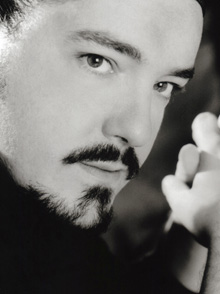
HYPNOTIC AND STUNNING Pianist Roberto Poli's performance was the soul of the Rivers School's Chopin concert. |
The Rivers School Conservatory in Weston mounted an ambitious three-day Chopin symposium last weekend featuring lectures and performances by faculty members, former faculty members, and distinguished guests. I regret that I could attend only the closing concert, which was both a fascinating glimpse into history and a remarkable musical experience.
The concert was a recreation of one organized by Chopin himself at the Salons Pleyel in Paris, February 21, 1842. Chopin was a phenomenon, but unlike Liszt, he didn't appear a lot in public. And what was most striking about this concert is that he wasn't the only performer. Also appearing on the program were his cellist friend Auguste Franchomme and a young pianist/composer/mezzo-soprano, the not-yet-legendary Pauline Viardot-Garcia (younger sister of another opera legend, Maria Malibran). At Rivers, Franchomme was Ronald Lowry (principal cellist of the Pops Esplanade Orchestra), Viardot was mezzo-soprano Victoria Avetisyan (whom I remember warmly in Opera Boston's brilliant production of Shostakovich's The Nose), and Chopin himself was Roberto Poli, the Rivers School's artist-in-residence and co-chair of the piano department.
We evidently don't know what cello pieces Franchomme performed. Lowry gave us three movements from Bach's Solo Cello Suite No 6, making a point of Bach's influence on Chopin. I wish this excellent player demonstrated more of Bach's joyful free-spiritedness. In the small but acoustically vivid Rivers concert hall, the cello sounded too loud.
As early as Berlioz, admirers of Chopin referred to his "singing" piano. That morning, Lowry and Poli had given a joint discussion called "Chopin at the Opera," in which they played and explained the operatic references in Chopin's Duo Concertante on Themes from Meyerbeer's Robert le Diable. The connection between Chopin and vocal music was a key part of the original Pleyel recital. Viardot sang a folk-like Italian aria by Josef Dessauer, "Felice donzella" (the Hamburg State and University Library provided Rivers with a facsimile of its unique copy of this score), and some Handel, accompanying herself on the piano. At Rivers, Avetisyan, accompanied by Poli, chose two famous but abbreviated Handel arias that Viardot might have sung. She too was too loud for this hall, and given Viardot's reputation for drama, maybe didn't pay enough attention to the words.
But the soul of this concert, as it surely was in 1842, was the piano playing. And Poli, who was born in Venice and came to Boston in 1998 to study with Russell Sherman, is one of our keyboard masters. He played two "suites" of Chopin's shorter pieces, including the third Ballade, which Chopin played at Pleyel. He was almost improvisatory in these juxtapositions, capturing the profound quietude of the Nocturnes (the C-minor Opus 48, No. 1 disappearing into an infinite pianissimo), the questioning and drama of the Ballade, the playfulness and heroism of the Mazurkas, the slippery complexity of the Études. And he was literally improvisatory in his invention of connecting links between some of the pieces. Poli's singing tone, wide dynamic range, nuanced phrasing, sensitivity of touch, magical pedaling (especially in the haunting D-flat Nocturne, Opus 27, No. 2) were part of an overall unforced freedom and deep thinking about this music — the work of a major artist, hypnotic and stunning performances